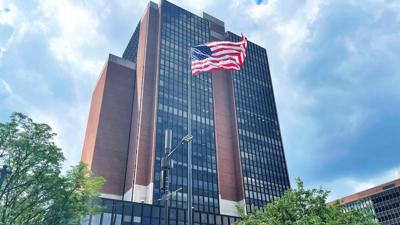
James A. Byrne U.S. Courthouse in Philadelphia
PHILADELPHIA – A Marple Township cop isn’t to blame for the death of a man he attempted to get on a bus to Philadelphia, after the man was left behind at a mall while intoxicated.
Philadelphia federal judge Gerald McHugh on Aug. 21 granted summary judgment for the town and Officer David Lerro, ending a lawsuit filed on behalf of the Estate of Cornell Pearson in November 2023.
Like other cases asserting a “state-created danger,” McHugh had to determine if Lerro’s decision to leave Pearson at a bus stop shocked the conscience. Pearson was struck and killed by a vehicle while trying to cross West Chester Pike, and the lawsuit blamed Lerro for taking him from the mall parking lot to a bus stop.
“Here, Mr. Pearson was intoxicated, stranded and in some danger in either situation,” McHugh wrote.
“While the specific dangers in the parking lot and at the bus stop might differ in kind, the overall risks are comparable. This simple change in location cannot support a violation of the Constitution.
“For state action to shock the conscience, it must meaningfully alter the risks faced by the person affected…. I conclude as a matter of law that Officer Lerro did not intervene in any way that exposed Mr. Pearson to any danger he did not already face…”
Pearson went with friends to a strip mall in Springfield in November 2021 but they soon lost contact with him. After being told Pearson was coming out to the car, they waited but eventually drove home without him.
Pearson’s niece, Naiesha Cook, came across Pearson in a Marshalls and testified he “appeared to be confused.” She offered a ride but Pearson said he was waiting to catch one with someone else.
But at 7:21 p.m. that night, Marple officers were sent to the parking lot. Complaints had come in that there was a suspicious person looking into vehicles. Pearson told Lerro he was waiting for his girlfriend to get off work at Marshalls and asked for a ride back to Philadelphia.
Plaintiffs first alleged Lerro intervened even though the girlfriend was prepared to give Pearson a ride, but discovery showed that she wasn’t at the mall that day and never worked at a Marshalls.
Lerro couldn’t leave Marple while on duty, so he drove him to the bus stop. Audio recorded Pearson slurring his words and repeating himself several times, and Lerro left him at the bus stop.
An autopsy showed a blood alcohol level of .238%. The lawsuit alleged Lerro left him in danger and the town’s policies for handling intoxicated persons led to Pearson’s death.
“(I)t cannot be said that Officer Lerro’s ultimate choice to give Mr. Pearson a courtesy transport to the bus stop showed conscious disregard of Mr. Pearson’s safety,” McHugh wrote.
“At best, Officer Lerro was earnestly trying to get Mr. Pearson home safely on the most direct route available to him within the confines of his job responsibilities, without resorting to the more drastic alternatives of arrest or protective custody.
“At worst, Lerro thought he was helping Pearson get home but seriously miscalculated Pearson’s ability to get himself on the bus safely in his intoxicated state.”
McHugh applied the high bar to state-created danger claims that have led to their rejection in other notable cases this year.
Philadelphia defeated a claim alleging overcrowding and faulty smoke detectors in public housing led to 12 deaths in a fire. Chester County and two school districts did the same in a lawsuit over the torture and death of a student who weighed only 50 pounds when she died at 12 years old.
And Pittsburgh cops weren’t liable for the death of a woman who, similar to Pearson, was left in an intoxicated state after losing her ride and was hit by a car.


